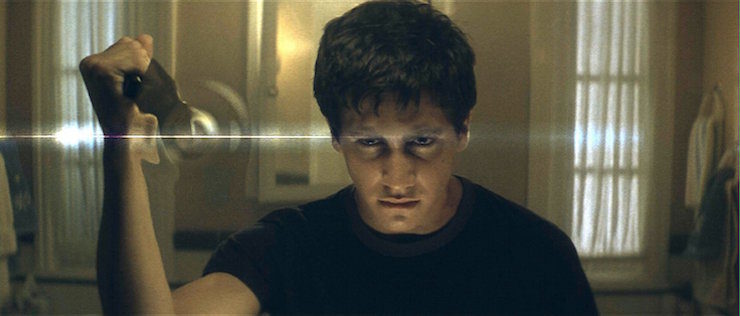Donnie Darko, the film, is now almost as old as its titular leading character. While the years hang very heavily on his shoulders, they’re sitting very lightly on the movie. Rereleased this week to mark its 15th anniversary, Donnie Darko is a haunting puzzle box of a film that rewards repeated viewings. Especially now, as we sit in a liminal space that’s very similar to the one which surrounds the Darko family. They are trapped in the run-up to an election, a period where nothing quite happens. We’re trapped in the aftermath of one, in the closing weeks of a year that has been difficult in almost every way imaginable. Donnie’s disbelief at his world and his bone-numbing fatigue in the face of how hard everything is has always been familiar, but it’s rarely felt more relevant than it does now.
That relevance echoes up and down the movie, especially with regard to Donnie’s mental health. The film deals with his problems in a refreshingly grounded way. We don’t see what got Donnie sent to therapy, although we do hear about it. Instead, we see his meds, sit at the table within the strained resentful silences of the family, and watch as Donnie finds the end of the world as a means of self-expression. The film’s exploration of depression is surprisingly pragmatic and grounded. It’s also, in places, painfully and compassionately familiar. Even if the black dog has never played at the bottom of your garden, Donnie’s railing against his world will strike a chord. He’s very clever, very frightened and very naive. He’s also the mid-point on a line that can be drawn from Holden Caulfield to Tyler Durden. Donnie is more focused and less angry than Holden but possesses none of Tyler’s cheery amorality. He wants things to be right, he wants to do the right thing, and anything outside that focus is either wrong or not worth his time. That ethical simplicity is where Gyllenhaal is at his most affecting, showing us both what Donnie thinks he is and who he really is. It’s a tremendously effective portrayal of a gifted, troubled young man and Gyllenhaal has rarely been better than he is here. There’s no front here, no preening. We see Donnie as who he truly is: brilliant, tortured, cruel, mundane, compassionate, and complicated.
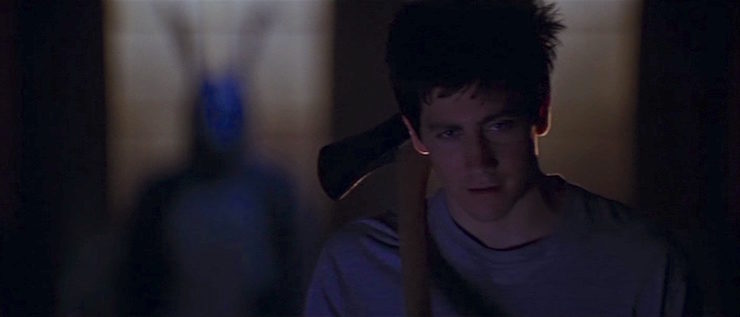
That complexity ties into the multiple narratives in which Donnie is trapped. The film opens with something impossible happening, as a jet engine crashes through the roof of the Darko house, into his bedroom. He’s not there, thanks to a sleepwalking incident which ends with Donnie being told that the world will end inside a month. As the film continues, that growing sense of doom combines with the overhanging clouds of the election, the dark secrets of his town, and the horrors of his school. Donnie is repeatedly manipulated into being a catalyst for change within each one of those stories and, for the most part, lets himself be swept along. He’s unchained from the world by his meds, alienated from his family by his mental state and his adolescence. He’s a Green Day lyric in a good hoodie, a young man simultaneously part of and far above his world. One of the film’s best moments is when his sort-of girlfriend Gretchen jokes that his name makes him sound like a superhero. Donnie’s response:
“What makes you think I’m not?”
The line could be read as a joke but is also both a boast and an honest question. He’s a terrified young man being used by external forces to dismantle his world. He senses that, but can’t articulate it. Why wouldn’t he make his peace with his life through the lens of superheroism? It ties into his adolescence, his entitlement, his survival strategies, and the otherworldly events that sweep over him. We’re all the heroes of our own story. Donnie is the hero of everyone’s story and that weight almost breaks him in two. He copes any way he can.
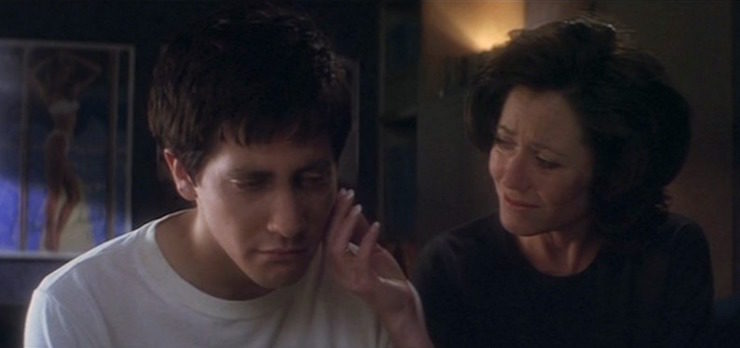
If the film only featured one character this complex it would be impressive, but the entire cast is this interesting. Mary McDonnell in particular is incredibly good here, balancing the arch stillness that would make her BSG turn so memorable with the bone-dry wit of her role in Sneakers. Rose Darko is far more aware of what’s going on than anyone else and has a mischievous streak that her son has certainly inherited. She’s simultaneously Donnie’s worst enemy and the person who knows him best and if there’s one problem with this cut, it’s the absence of their final moment of reconciliation.
Elsewhere in the cast, Gyllenhaal’s own sister Maggie does excellent work as Donnie’s sister Elizabeth. Their epically profane bickering plays like improvisation and the family dinners are some of the film’s best scenes, all controlled, belligerent, sometimes affectionate chaos. Likewise, Jena Malone is fantastic as Gretchen, whose relationship with Donnie hints at a lot of what’s really going on…
But if the film has an MVP other than Gyllenhaal, it’s the late Patrick Swayze. Swayze plays Jim Cunningham, a self-help guru brought into Donnie’s school by the gloriously awful Kitty Farmer, a member of the faculty. Farmer, played with total straight-faced gusto by the magnificent Beth Grant, spends most of the film as a comedic monster. As it closes, we see not only a more human side of her but also just how much she’s been betrayed by Cunningham. Swayze is the perfect choice here: all big smiles, big suits, and hyper-sincerity. The fact that Cunningham is revealed to be truly terrible is sold all the more by Swayze’s final scenes here, and the entire film stands as one of his finest hours.
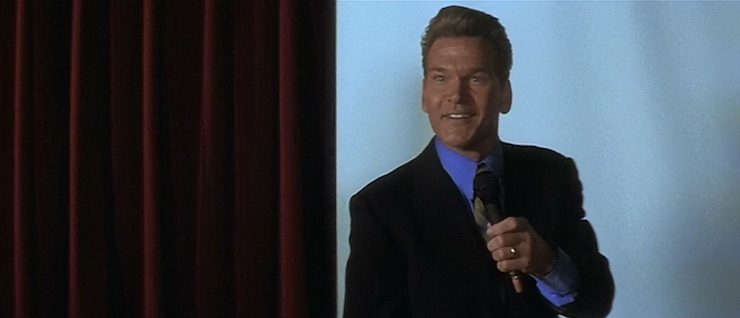
Further still down the cast list, Noah Wyle and Drew Barrymore are haunting as two of Donnie’s teachers. Both are very engaged, driven young progressives and both spend the entire film acting very, very oddly. My favorite moment remains this exchange between them in the staff room:
“..Donnie Darko.”
“I KNOW.”
There’s an entire conversation coded into those four words and the pair of them are instrumental in pushing Donnie towards his true destiny. Like him, they’re victims. Unlike him, they’re afforded a certain measure of knowledge of just what’s going on.
That in turn ties into the film’s greatest achievement: it’s constant sense of unease. Few movies made in the last couple of decades have felt more apocalyptic than Donnie Darko, and it’s no accident that one deleted scene directly equates the dream of the field of blood from Watership Down with what’s going on in the movie. This is a world that’s not just liminal but actively teetering on the edge. Everything from Donnie’s age to his family to Gretchen and his teachers pushes it closer and closer until, in the final scenes, every domino falls. Where they land, and where you leave the movie, remains a truly haunting experience. Not to mention, odds are, a frustrating one.
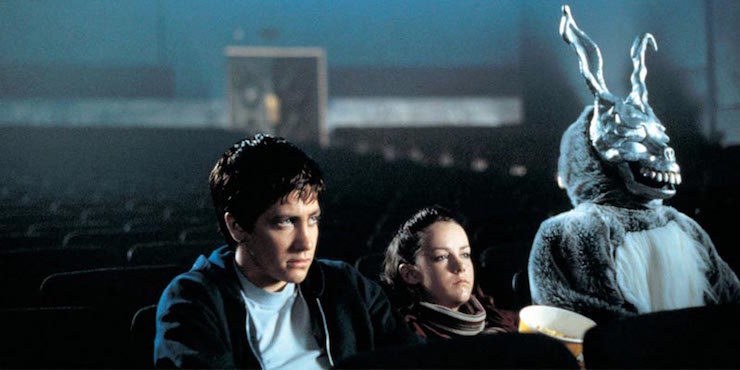
But that’s the point. A willfully confounding, complex film that tells you half of what you need to know and only tells the truth occasionally, Donnie Darko is a towering achievement even now, fifteen years on—if you haven’t seen it before, I honestly envy you. If you have, I am delighted to report that’s it’s still a mad world, and one that rewards revisiting.
Alasdair Stuart is a freelancer writer, RPG writer and podcaster. He owns Escape Artists, who publish the short fiction podcasts Escape Pod, Pseudopod, Podcastle, Cast of Wonders, and the magazine Mothership Zeta. He blogs enthusiastically about pop culture, cooking and exercise at Alasdairstuart.com, and tweets @AlasdairStuart.










